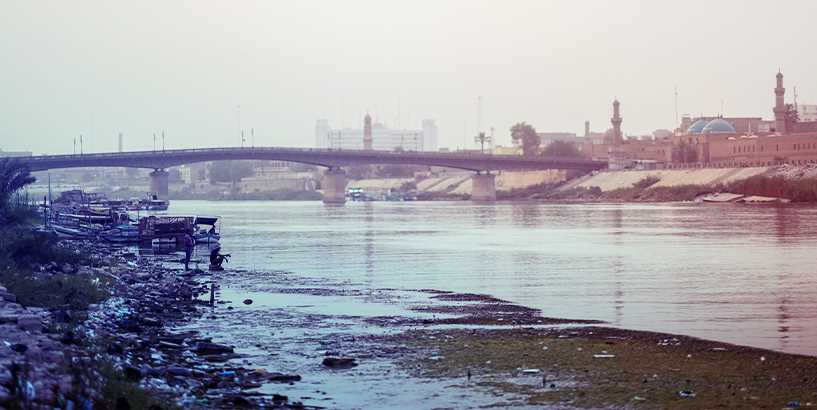Southern Iraq’s water crisis has reached unprecedented levels as the Tigris and Euphrates rivers’ water levels have decreased dramatically. Iraqi officials have pledged to take measures to address the ongoing drought in Iraq.
An AFP photographer in the city of Nasiriyah reported seeing the bed of the Euphrates River from its banks. Baghdad has accused its neighbours Turkiye and Iran of reducing water rations reaching Iraq by building dams on the two rivers.
The Iraqi Ministry of Water Resources attributed the drought in Iraq in some southern provinces to “the low quantity of water reaching Iraq from neighbouring Turkey,” as well as Iraqi farmers who misuse water resources to irrigate their land instead of following the ministry’s guidelines.
To cope with water scarcity as a result of the drought in Iraq, the Iraqi government has implemented water rationing for various needs, such as irrigation, agriculture, drinking, and feeding the marshes of southern Iraq. The Ministry of Water Resources stated that the decrease in water shares in some governorates is due to the lack of water revenues coming to the dams, leading to a sharp decrease in the country’s water storage.
Iraqi officials have promised to take measures to address the crisis, although it is unclear what actions will be taken. The water scarcity issue poses a significant threat to the country’s agricultural sector, as well as the health and wellbeing of its citizens who rely on the rivers for their daily needs. The drought in Iraq has severe consequences for the country’s economy, environment, and people. The reduced water levels in the Tigris and Euphrates rivers are set to impact the agricultural sector, which accounts for a significant portion of the country’s economy. Additionally, the lack of water may result in the drying up of marshes and wetlands, which are important ecosystems that support a diverse range of flora and fauna.
Drought in Iraq – a result of climate change?
The water scarcity crisis in Iraq has been further compounded by climate change, which is causing prolonged droughts in the region. The Middle East has been identified as one of the most vulnerable regions to the impacts of climate change, and Iraq is no exception.
The country has seen a significant decrease in rainfall in recent years, resulting in reduced water levels in its rivers and reservoirs. The country’s agricultural sector, which accounts for a significant portion of its economy, has been particularly hard hit by the drought.
Experts warn that the situation is likely to worsen in the coming years, as climate change exacerbates the water scarcity problem in the region. According to a report by the World Resources Institute, the Middle East and North Africa region is expected to face “severe water stress” by 2040, with Iraq being one of the most affected countries.



















